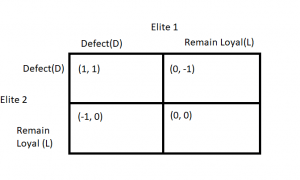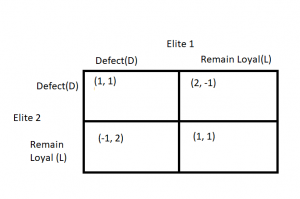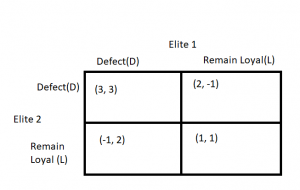Game Theory Applied to the Politics of “Elite Fracture” in Venezuela
The linked article from the New York Times features a discussion about the concept of “elite fracture” as it applies to the political situation in Venezuela circa 2017. Elite fracture refers to a situation wherein a critical mass of military and political officials and other elites “defect” in opposition to the ruling faction, in this case the loyalists of President Nicolás Maduro, resulting in a collapse of the ruling faction and new leadership.
During the time of the article’s publication and indeed the present day, Venezuela has been experiencing an economic and political crisis which has resulted in severe food shortages, high unemployment, and increased political corruption, crime, and poverty. The Maduro government continues to hold power: despite an elite fracture theoretically expected by political scientists, one has not occurred.
The situation faced by elites can be considered through a game theoretic framework, and thought of as a form of the Prisoner’s Dilemma discussed in class. By reducing the size of the game to only two elites, we can model the payoff table as follows:
In figure 1 above, if both elites remain loyal to the government, they receive nothing. If either one defects while the other does not, the defector is liable to be punished by the government, thus receives a value of -1. If both defect, they receive a value of 1 each, representing the value gained by elites in the event of a leadership change, operating on the assumption that the economy will be reinvigorated and the situation in Venezuela will improve. (D, D) and (L, L) are both Nash equilibria — each elite is making the best possible decision given that of the other.
Figure 1
Given this model of elite behavior, the regime is able to manipulate incentives to strengthen their hold on power. Specifically, the article cites the facilitation of corruption, drug and food smuggling that generates revenue for the military, patronage such as control of gold mining operations being handed to the military during the time of Hugo Chavez, and most importantly the provision of favorable exchange rates to certain elites: official government exchange rates value the Venezuelan bolivar far more than unofficial, market-determined exchange rates, resulting in large financial gains for those who have access to exchanging bolivars for foreign currency at the official exchange rate. Assuming that the behavior of elites follows rational self-interest, and that the value of the government’s financial provisions discussed above and the value of benefits gained by elites following leadership change are equal (and are believed to be equal by elites,) we can model the payoff matrix as follows:
Figure 2
It is important to note that in the situations (L, D) and (D, L,) wherein one elite defects and the other remains loyal that the elite remaining loyal has a greater payoff — 2 — than they would if they both remained loyal. This is because as the Venezuelan economy suffers and shrinks, competition among elites increases, and if elites remain loyal while others defect and face punishment, the “share of the pie” of loyal elites should theoretically increase and is represented by 2.
Hence we can see that once the government introduces strong enough incentives to remain loyal and competition among elites reaches a certain degree, remaining loyal becomes the dominant strategy for elites, and both elites defecting (D, D) is no longer a Nash equilibrium, as the best strategy for when the other elite defects is to remain loyal, and receive a greater share of patronage. In fact, under such a model, self interested actors are liable to remain loyal even and especially if others defect.
Operating on a different set of economic and political assumptions, we can think of the situation slightly differently. In the case that a leadership change will result in significantly improved outcomes for elites than their outcomes under the Maduro regime — perhaps because of a larger economy — and the elites believe this to be the case, we can model the payoff matrix as follows:
Figure 3
This can be thought of as a version of the Stag Hunt discussed in class as if the elites fail to coordinate, the elite aiming for the higher-payoff outcomes (defection,) is penalized more than the elite aiming for the lower-payoff outcome — if elites coordinate and collectively defect to bring about leadership change, they both receive a greater reward than they would if they both remained loyal, but if only one defects, the defector receives punishment. Unlike the situation described in fig. 2, both elites defecting is indeed a Nash equilibrium in this case.
There remain imperfections in such models: most obviously, mapping values onto political outcomes, especially the payoff to individual actors in the case of a leadership change is bound to be at least somewhat inaccurate given the sheer number of individual actors and the dynamism and qualitative nature of many of the political factors at play. Furthermore, the Stag Hunt version of the model assumes that there will be an increased payoff to the elites in the case of a leadership change, but it is entirely possible for there to be no increased payoff, or even decreased payoffs. Furthermore, the models do not account for the risk of sanctions or criminal charges that may be brought against the elites who remain loyal to the regime as international pressure mounts, as discussed in the article. Lastly, the game is limited to only two elites and assumes a unified ruling bloc — in fact there are many players, each with individual incentives.
That said, the model underscores the fundamentally strategic (and indeed, game-theoretic) nature of the decision-making process of elites. Furthermore, through this game-theoretic lens we can observe the economic underpinnings and institutional incentives of practices such as corruption and patronage which are prevalent in authoritarian regimes, depicting the mathematical justification for why rulers allow elites, on whose support their power depends, to engage in such practices, and further yet reveals the incentive that rulers, especially of authoritarian regimes have to keep elites divided.
LINK:https://www.nytimes.com/2017/05/06/world/americas/venezuela-unrest-protests.html?smid=tw-share



